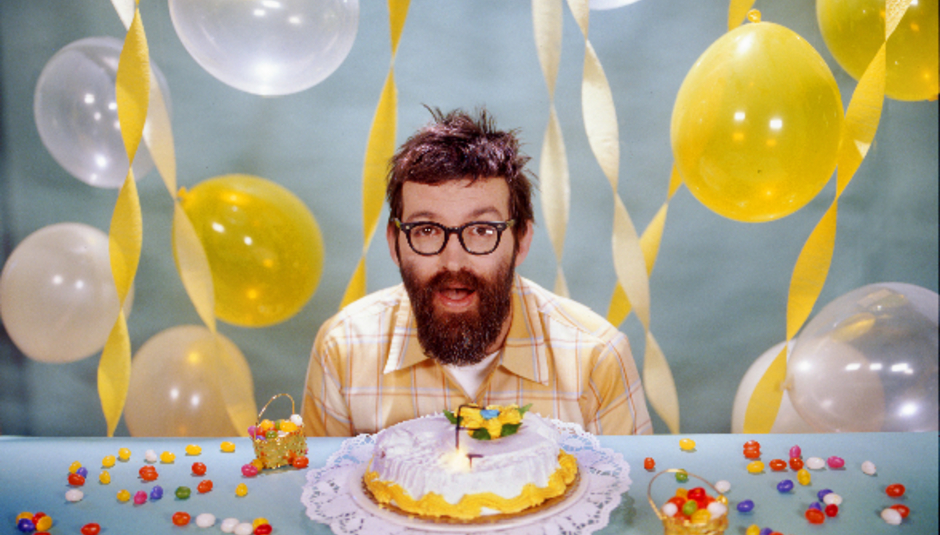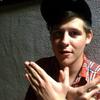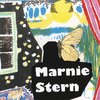Mark Oliver Everett is walking through Hyde Park to meet me. The man called ‘E’ is currently in the most prolific form of his life, about to release his third Eels album in just under two years. Then he’ll set off on a world tour that will take in Japan, Australia, Europe and Canada before heading back through the States to his home in California. The sun is shining. God damn right, it’s a beautiful day.
Just as he nears the edge of the park, two policemen accost him. Apparently, they’ve had a report that someone matching his description - beard, cuffed jeans, blue jacket – was staring suspiciously at nearby embassies and hotels. E starts to smile, but they’re not laughing. Before they search him, he digs in his pockets and retrieves his hotel key. “Why would I be staring at my own hotel?” he asks them, baffled. After some discussion, they agree to let him go. Hey man, now you’re really living.
He explains what happened to him as soon as he arrives. “Now I'm on some terrorist watchlist, I think.” He lets a low laugh escape from the thick black fuzz of his beard, but he’s clearly annoyed. “The whole thing was so ludicrous! Someone was telling me that this is a very snobby area. Apparently you're not allowed to look like me here.” He stares out of the window at the park he’s talking about and shrugs. “I used to enjoy walking around here but I don't know if I can now. I feel weird about it.”
It is safe to say that this is not the first weird thing that has ever happened to E. It’s not even the first weird thing that’s ever happened to him at this hotel. He was staying here, next door to Kensington Palace, the day Princess Diana died. He was supposed to be promoting his first Eels album, Beautiful Freak, but instead he ended up spending a week watching the masses queue to leave flowers at the gate while the country seemed to grind to a halt. His song ‘Your Lucky Day in Hell’ was deemed to no longer be appropriate for Top of the Pops.
As has been well documented, E has had more than his fair share of grieving to do. While he watched the public outpourings over Diana, he was still reeling from his sister's suicide. At 19 he was alone when he discovered his father slumped dead at home. Later, he would nurse his mother through a slow, painful and ultimately fatal fight with cancer. On September 11, 2001 his cousin Jennifer was working as a flight attendant on the plane that hit The Pentagon, where his father had once worked. Now, as he prepares to release Tomorrow Morning, the final album in a trilogy which started with 2009's Hombre Lobo and continued with End Times, he tells me of the sense of urgency that drives him: “I've always had that, because of my family history. I've always felt that I better strike while I can.”
Having lived through such a litany of misfortune, E’s music has often been wreathed in tragedy. He agrees though that even amongst Eels albums this year’s End Times ranked among the most melancholy. He laughs: “I probably thought, you know, ‘Everyone's always calling my albums sad – I'll show them sad!’ I wanted to make the other ones look happy!” He does however take me to task for assuming, in my reviewof End Times, that ‘The Mansions of Los Feliz’ included his own home: “I don't live in a big mansion!” he says, then thinks for a beat. “Well, I like to think of it as a mansion, but it's not.”
“After that last one, in my mind, there was only one direction to go. I had to go up!” says E of Tomorrow Morning. “I didn't want to go any further down,” he laughs again. “I didn't think that album would be releaseable. It'd be too much!” For E, making an upbeat album brings with it its own problems. He would loathe to produce anything trite. “I think this kind of album is the biggest challenge. It’s the hardest thing to do: to try to do something overtly uplifting and happy-sounding but to do that in a meaningful way.”
As someone who writes such intensely personal music it’s hard to imagine him sitting down to write a dancefloor-filler or stadium anthem. Who does he write for? “I just write for my demographic,” he says with a knowing smile. “No, I just write for myself. You've gotta just treat yourself as the audience. I don't know how else you could do it.”
When he was first signed to a label, as a solo artist, he was in the rare position of signing a deal without having performed his music live. Looking back, he says his formative musical experiences meant it wasn't so hard to translate his bedroom tapes into the live arena: "It was an interesting experience for me. I grew up as a drummer. I played in a lot of bar bands and stuff in Virginia, but I'd never been a frontman until after my first album came out. Everyone, I think, just expected me to not be a very good live performer because I was this kid making tapes in his closet. It surprised everyone, myself included, that I seemed to have a natural knack for live performing."
His ability as a performer is complemented by his desire for invention, which ensures that every Eels tour seems fundamentally unlike the last and also to exist separately from his records. “I just don't like ever to treat a show and an album as the same thing. I treat a show like it's its own album. It's its own beast, completely. I understand that that can be frustrating for certain kinds of audience members, but once again I'm just trying to please myself, the audience member, and that’s the kind of artist that I always enjoy going to see. People that switch it up.”
The obvious comparison seems to be with Dylan, one of his great heroes, going electric. "Right, there's a whole bunch of good examples. I can't imagine being the kind of person that wants to go see the same thing over and over again. It's weird though, because there are all sorts of people that have giant careers who do that. Every year people go to their concerts and it sounds exactly like the record. I just don't get it."
Which is why he’s so determined to switch it up. I remind him that when I saw Eels a few years ago he was accompanied on stage by a security guard who burst into dance halfway through the set. “That's right! 2006 was the dancing security guard year. That was fun!” He adds that anyone coming to this year’s world tour should cast their expectations aside. “You should expect nothing, because it's always a mistake. The thing I always enjoyed the most, when I was a teenager and I'd go to a show, was not knowing what to expect and being surprised in some way. That was my favourite part of it - when that happened. So, it's smart to not have expectations. I've never had expectations about my life or anything, because I learned early on there's no point in it. If people want to expect a certain thing, and I don't give them what they expect, I feel like that's a success!” He chuckles wryly, “But they might feel frustrated by that, so what can I do?”
He says he takes a similar approach to his records, but points out that he doesn’t change things purely for the sake of variety. “I'm not trying to dazzle people with being versatile. I'm not going to make a record that's in some genre just because I haven't already. I'm only going to do what naturally comes out of me.” Intriguingly though, he corrects me when I suggest that we can rule out an Eels jazz album: “Well no, that is possible. That could happen.” To be safe, he picks a more obscure example of an unlikely genre: “I'm not going to make a polka record, because I'm not that interested in polka, although that may change some day. But so far, it's not.” He smiles and glances away: “The jazz record is possible, though.”
At the moment, having completed this trilogy, this cycle of words and music, E is happy to look into a future with no clear path mapped out for him. “For the last couple of years I've known that I was doing these three records although I trained myself to get good at not talking about it too soon, because I didn't want to paint myself into a corner. I knew I might change my mind along the way, and I didn't want to 'have' to do it. But now it's okay because I’ve seen it through and that's the end of it. So for the last couple of years everything was kinda mapped out in my mind, but now it's wide open. I don't know what happens atall. I don't know where I'm going next. Which is exciting. After the tour is over, I don't know what happens next. It's a place I haven't been to for a while.”
You shouldn’t expect him to take too long a break. Making music is a compulsion. “For someone like me, there's a million reasons to do it. It just serves me on so many different levels. I feel so lucky that I get to do it. Also, I think a lot of people who do what I do have an obsessive element to their personality. You kinda have to have that, to be such a factory. A lot of the issues in my life are the opposite of most people's issues. A lot of people have a problem that they don't work enough, or have a problem following through their ideas. I have to worry about what I think about because I will probably follow through on it, so I have to be careful what I wish for because I might not want that much work.”
In 2008 he made a documentary about his father, Parallel Worlds, Parallel Lives, and came to see that this obsessive streak was perhaps inherited. His father, Hugh Everett III, was a quantum physicist who rarely spoke to his children because he was so wrapped up in developing his Many Worlds Theory. I ask E whether the experience of getting to know his father’s work has affected his own. “I don't know how that's affected my work, exactly. Definitely personally it had a big effect on me, and a very good effect. I'm not sure how that relates to the work yet, though. That might not be clear to me for a few more years.”
His mother’s birdwatching seems to have had a more direct influence on him. After ‘I Like Birds’ and ‘Little Bird’, the new record includes a song called ‘I’m a Hummingbird’ and he still has her bird tables at his home in Los Feliz. “That's where the idea for this new song came from, a hummingbird on my back porch. They're just so amazing. They must get so tired!”
2008 seemed to be a year of taking stock for E. As well as the documentary about his father, Eels released two compilations, Meet The Eels: Essential Eels and Useless Trinkets and he published his critically-acclaimed memoir Things The Grandchildren Should Know. I ask whether he nows sees that as a cathartic experience, having released a trio of albums in quick succession since then. “It's strange to do all that stuff that early in your life. I mean, none of us know how long we're going to live, but usually you write your memoirs when you retire, or whatever, so now I'm in this strange sort of 'Part 2' feeling of my life. It's kinda unusual.”
As he enters his life’s second act he’s still as determined as ever to do things his own way. “It's the sickness of the times we live in now: the way that everything is made by committee. Everthing has a focus group. It's just a horrible way to make things. The age of the auteur is quickly dying. You look at the film world. All the genius film-makers wouldn't be able to make movies, the way things work today. It would be impossible for anyone who had a strong artistic vision to see it through.”
When I ask about the artists he admires, it’s “auteurs” that he turns to while admitting that his tastes are “the usual suspects”. “I just feel like, if you're going to do anything, why not go to the best? If you're going to watch movies, watch Stanley Kubrik movies. If you're going to listen to music, listen to Bob Dylan or The Beatles.”
E is also doggedly resistant to the commodification of his music. "I think I'm starting to look pretty old-fashioned about that, because everybody does it now, but I don't think that means it's the right thing to do. I can understand a brand new band doing it, because it might be one of the only ways for people to hear their music, but I have an ethical issue with what the music's about. It's just important to me that the music means something, you know? I just feel like, if it's selling a product, other than itself, it becomes meaningless.”
His refusal to sell out is also motivated by his desire to build a body of work that he can feel proud of. “You want to try and look back on your life at the end and look at the CD shelf and feel good about what you have sitting there.” He pauses, then laughs. “If you have your own CDs on your shelf, that is!”
For me, it’s this sense of perspective that makes E’s music so life-affirming. Gazing out of the hotel window we have a clear view across to the Royal Albert Hall. Things The Grandchildren Should Know concludes with a moving passage about the sense of validation he felt playing his songs there, a feeling of catharsis that he'd managed to turn every shitty hand he'd ever been dealt into music that creates a “sense of community”. He also wrote that being exposed to so much death and grief throughout his life had changed his whole worldview: “I realized that people probably liked to look at the vast horizon of the beach and the endless sky at night because it took them out of their daily routine and reminded them about the bigger things. But I never seemed to stop thinking about these bigger things.”
What makes him such a perceptive songwriter is precisely that understanding of the bigger things. Although he wears it lightly, that burden must still weigh heavily on his soul, as much a curse as a blessing. Talking to E, I’m reminded of Douglas Adams. I ask him whether he knows The Hitchhiker’s Guide To The Galaxy? “Yeah?” he replies.
I start to recount the story of the Total Perspective Vortex. The Total Perspective Vortex is the most horrible form of torture any sentient being can be subjected to and it was invented by a man to annoy his wife. She would nag him for having no sense of proportion, so he decided to invent a machine that would illustrate exactly what having a sense of proportion means. When you’re placed inside the Vortex you are given just one momentary glimpse of the entire, unimaginable infinity of creation, and somewhere in it a tiny little mark, a microscopic dot on a microscopic dot, which says simply, “You are here.” The machine destroyed his wife’s brain, but the man was comforted by the fact that he had been right and she had been wrong. As Adams wrote, the machine proved that: “In an infinite universe, the one thing sentient life cannot afford to have is a sense of proportion.”
E laughs loudly. He pauses for a second, then shrugs. “Yeah. It’s true. Every once in a while you've got to remind yourself how insignificant you are.”
Tomorrow Morning is out on 23rd August on E Works.























